Nephrology Fellowship Curriculum
The program is organized to provide the fellow with meaningful experiences in clinical nephrology, teaching, and research.
Quick links
Program Overview
Established in 1974, the program offers nephrology fellows broad clinical experiences and resources to build their knowledge base, enhance their skills, and perform meaningful clinical research. With a diverse faculty committed to teaching and dedicated program leadership, the Nephrology fellowship program at AHN provides fellows with an exceptional, well balanced training experience.
Coming Soon: POCUS training.
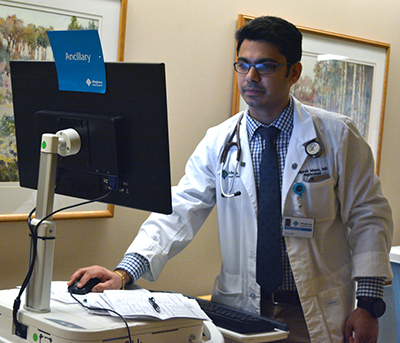
Fellows will become competent in a variety of procedural skills, including renal biopsy of native and transplanted kidneys and placement of temporary dialysis access catheters. They will also become competent in prescribing and supervising acute and chronic hemodialysis, peritoneal dialysis, and CVVHD. They will develop skill in interpreting diagnostic studies such as renal ultrasonography, excretory urography, renal angiography, radionuclide imaging of the kidney, renal biopsy and urine/serum chemistries. Fellows will also have exposure to interventional nephrology, and will have a significant opportunity to master the medical management of transplantation by participating in the care of a large number of kidney and simultaneous kidney-pancreas transplant patients.
The skills necessary for critical analysis of the scientific literature are stressed through participation in weekly conferences, such as Journal Club and research conferences. Fellows will also be expected to participate in independent research projects with a faculty member.
Finally, fellows will be responsible for supervising and teaching internal medicine residents and medical students on the clinical inpatient nephrology services.
Rotations
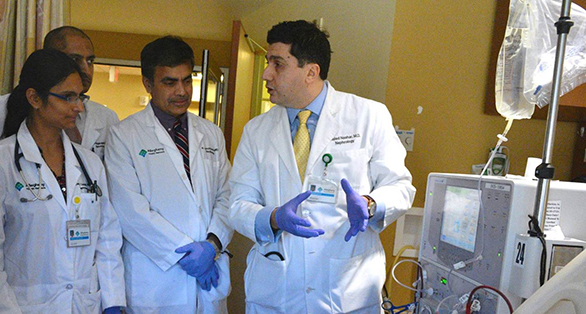
Allegheny General Hospital (AGH) Inpatient Consults: During this rotation, the nephrology fellow is provided with a diverse inpatient clinical nephrology experience and learns to manage complex patients who require ongoing dialysis in a major tertiary care setting. The nephrology fellow becomes proficient in inpatient consultations and follow-up, in handling the multitude of issues affecting patients with end-stage renal disease, in nephrologic critical care consultations, and follow-up including acute renal failure and oversight of continuous renal replacement therapies for acutely ill patients.
West Penn Hospital Inpatient Consults: During this rotation, the nephrology fellow is provided with the knowledge and experience to diagnose, treat, and manage patients in the inpatient setting of a primary care facility. This additional exposure complements inpatient experiences by allowing the fellows to care for patients in a primary care setting as compared to the tertiary care experiences at AGH. Fellows receive exposure to patients in the Autoimmunity Institute, Obstetrics-Gynecology, Burn, and Bone Marrow Transplant and Rehabilitation Units, which they do not receive at AGH.
AGH Inpatient Transplant: During this rotation the nephrology subspecialty fellow cares for renal transplant patients. The nephrology fellows are given the unique experience of caring for patients prior to, during and after renal transplantation.
Continuity Clinic: Following a 5:1 model, during this rotation the nephrology subspecialty fellow cares for outpatients, providing nephrology consultations and follow-up in multiple outpatient settings, including the outpatient clinics at Allegheny General Hospital, the Autoimmunity Institute multidisciplinary clinic at West Penn Hospital, and Suite M56 at West Penn Hospital. On Tuesday mornings, fellows also join the nephrology faculty and transplant team to treat patients throughout the transplantation process and participate in donor evaluations, pre- and post-transplant clinics, and multi-disciplinary transplantation conferences.
Electives: The fellow will select one of the following elective rotation experiences.
- Pediatric Nephrology: Following program coordinator approval, fellows have the opportunity to join the Pediatric Nephrology team at UPMC Children’s Hospital of Pittsburgh and participate in the evaluation and management of children with simple or complex nephrologic or urologic disorders including: complex and serious disorders resulting in end-stage renal disease requiring dialysis and/or transplantation, electrolyte disturbances, glomerulonephritis, hematuria, pediatric hypertension, proteinuria, and/or urinary tract infections. Offered PGY-5 year, only.
- Ambulatory Rotation: During this rotation the nephrology subspecialty fellow cares for outpatients, providing nephrology consultations and follow-up in multiple outpatient settings including the outpatient clinics at Allegheny General Hospital, the Autoimmunity Institute multidisciplinary clinic at West Penn Hospital, suburban renal outpatient clinics, and PD and HD clinics.
- Interventional Nephrology (TMA Vascular Access Center): During this rotation the nephrology subspecialty fellow is provided with exposure to interventional nephrology procedures including balloon angioplasty, declotting procedures, tunneled dialysis catheter placement, venogram, vein mapping, and stent placement.
- Clinical Skills: Fellows will become knowledgeable and further enhance their clinical skills in the following areas: pathology, radiology, tissue-typing, dialysis, TPN, plasmapheresis, and heart failure.
- Research: With prior approval, fellows will work closely with the Research Director, Dr. Kalathil Sureshkumar, during this experience to learn and develop the necessary ethical research practices to allow them to successfully complete assigned research projects.
Longitudinal experiences
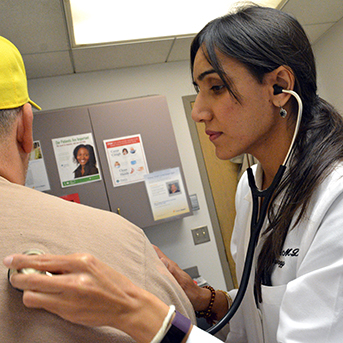
Primary training sites
Allegheny General Hospital (AGH)
320 E North Avenue
Pittsburgh, PA
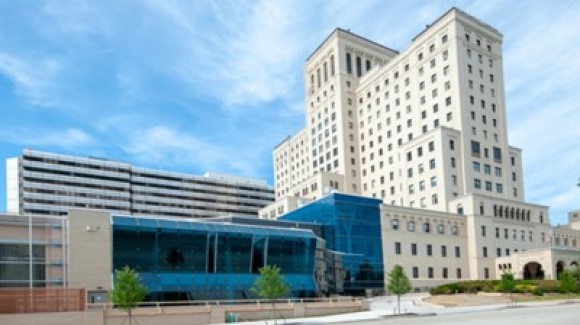
West Penn Hospital (WPH)
4800 Friendship Avenue
Pittsburgh, PA 15224
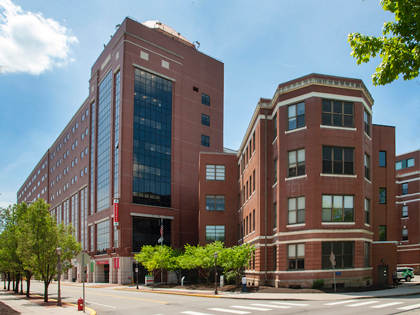
Conferences
Fellows are given the opportunity to attend and/or present at various conferences throughout their training. This experience allows them to enhance their training by learning from their peers, participating in discussions, and building their confidence.
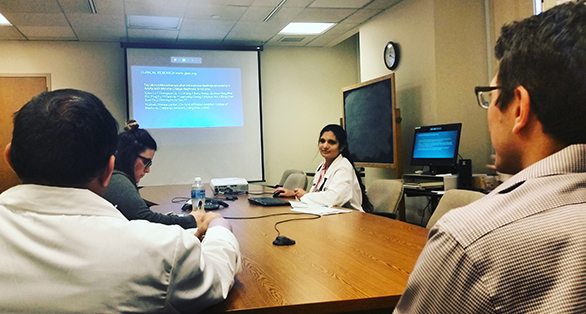
Core curriculum lecture series
The faculty and invited lecturers present a formal lecture to the fellows each week. The lecture series is designed to supplement information and add greater depth to the fellows' knowledge base. The lecture series is based upon a two-year revolving schedule designed to provide a comprehensive overview of the multitude of issues that confront the nephrologist. Clinical, ethical, and administrative topics dealing with patient care issues related to renal disease are presented.
Monthly Nephrology Conferences
- Journal Club
- Morbidity & Mortality/Quality Improvement Conference
- Board Review
- Clinical Conference
- Renal Grand Rounds
- Renal Biopsy Conference (second and fourth Monday of each month)
Multidisciplinary Conferences
- Combined Case Conference (ID, Nephrology, CCM)
- Transplant Conference
- Glomerulonephritis (GN) Board (Quarterly)
- Abdominal M&M Conference
- Medical Grand Rounds

